“The Duty of Government”: The Politics of the Domestic Postal Money Order, 1837–1911
Federal History 17 (April 2025): 11–33 [link]
The domestic postal money order is a neglected facet of the flurry of legislation enacted during the Civil War that expanded the national government. Its introduction extended the Post Office Department’s role beyond serving as a communications medium. The absence of southern legislators following secession who opposed expanding postal services created an opening to secure this reform. As the service matured, postal officials adjusted the policies governing money orders to better adapt them to emerging conditions. By providing a means for Americans to convey small sums of money securely over distances, the postal money order had the broader consequence of bolstering government efforts to promote economic development.
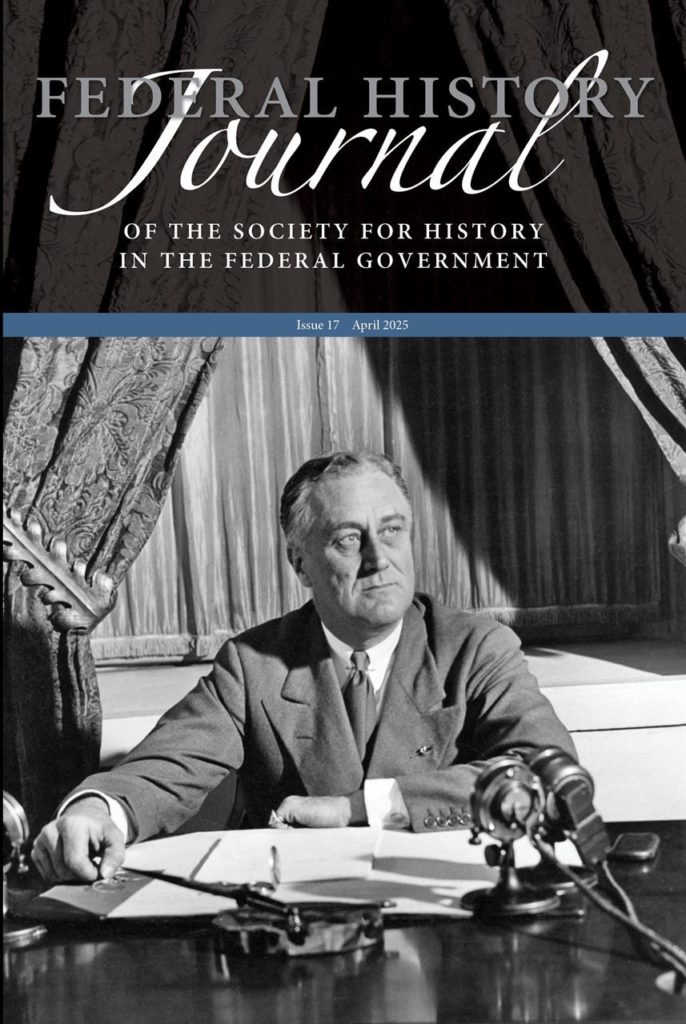
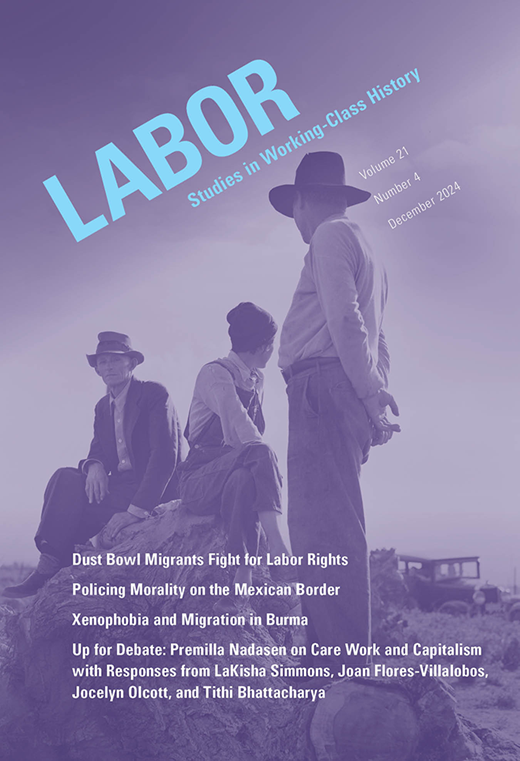
An Unfair Fight: Why Labor Unions and Dust Bowl Migrants Were Defeated in California’s Fields during the Great Depression
Labor: Studies in Working-Class History 21 (December 2024): 4–31 [link]
Among the many different groups that have labored in California’s fields over the years, scholars have singled out white migrants during the Great Depression from Oklahoma and adjacent states—often referred to as “Okies”—as particularly anti‐union. This ostensible aversion to labor unions—attributed to the group’s cultural characteristics—allegedly precluded agricultural unionization during the period, derailing organized labor in the fields of Depression‐era California. In fact, cultural traits had an equivocal influence and do not explain this outcome. Instead, structural factors determined the prospects for farm unions during the Depression.
Nationalize the Banks
Catalyst: A Journal of Theory and Strategy 8 (Summer 2024): 68–101 [link]
During the first half of the twentieth century, millions of American workers and farmers wanted to socialize banking. In a nation where socialist principles supposedly lacked appeal, grassroots support for public banks revealed the prevalence and popularity of economic ideas that intersected and overlapped with socialism. Banking politics also presents a potential source of working-class political mobilization today.
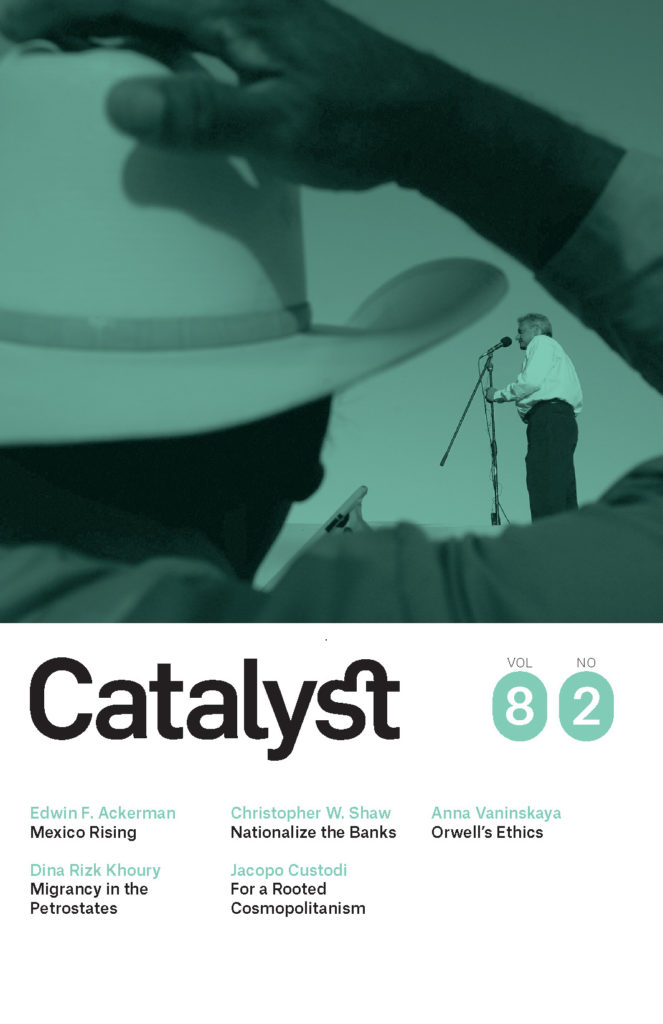

A Banker Aspires to “Bust the System”: P. B. Moss Campaigns to Nationalize Banking in the Great Depression
Montana: The Magazine of Western History 73 (Winter 2023): 63–78, 94–96 [link]
The financial and business leadership of banker P. B. Moss contributed greatly to the initial growth and development of Billings, Montana. Moss would seem an unlikely person to demand that banking be nationalized. Yet that is what he did during the Great Depression. Making credit more accessible by eliminating the banker as middleman, Moss insisted, would stimulate the troubled economy. The evolution of his opinions had placed Moss beyond the pale of the banking fraternity but his perspective lay within the mainstream of public opinion in Montana.
How the Midwest Shaped the Way We Bank: Early Twentieth-Century Banking Politics
Middle West Review 8 (Spring 2022): 135–39 [link]
Banking and monetary issues occupy a prominent place in midwestern political history. Narratives of the region’s nineteenth-century politics have long recounted the financial reform agendas of the Greenbacker and Populist movements. Yet the “money question” included broader concerns that remained at the center of progressive and populistic politics in the Midwest into the 1940s.

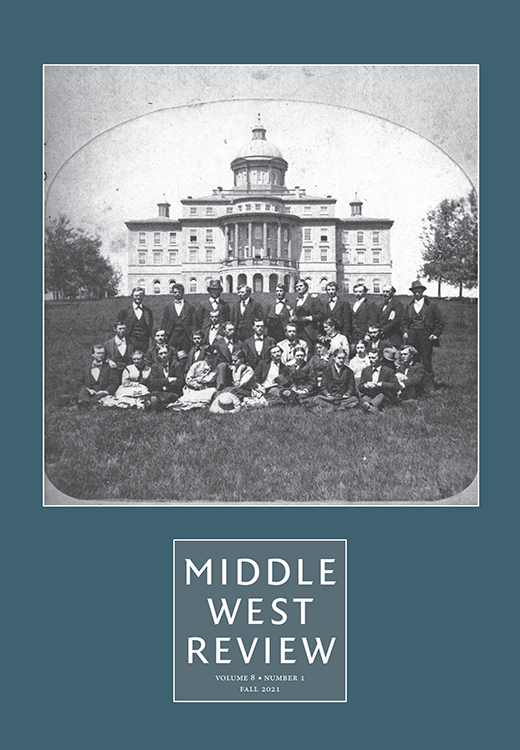
Progressive Insurgency in the Heartland
Middle West Review 8 (Fall 2021): 157–62 [link]
The Midwest’s political relevance is regularly reduced to its current electoral function as the site of the so-called “blue wall” of states that Democrats depend on in presidential elections. Generally overlooked in contemporary public discussion is the region’s history as a fountainhead of progressive politics. Historians have revealed a diverse midwestern tradition of protest and insurgency.
The Politics of Elite Anxiety: Carter Glass and American Financial Policy
The Historian 82 (Fall 2020): 308–27 [link]
Carter Glass played an important role in every financial question that the U.S. Congress addressed from the Federal Reserve Act through the New Deal. Although Glass is often remembered today as a reformer, he was fundamentally a reactionary whose foremost impulse was ensuring that the banking system remained the instrument of financial elites. He promoted legislation that upheld elite banking interests, and employed a rhetorical framework that denigrated subordinate groups and their allegedly unsound financial ideas. But the Great Depression left the bankers disgraced and discredited orthodoxies that Glass insisted were sacrosanct.
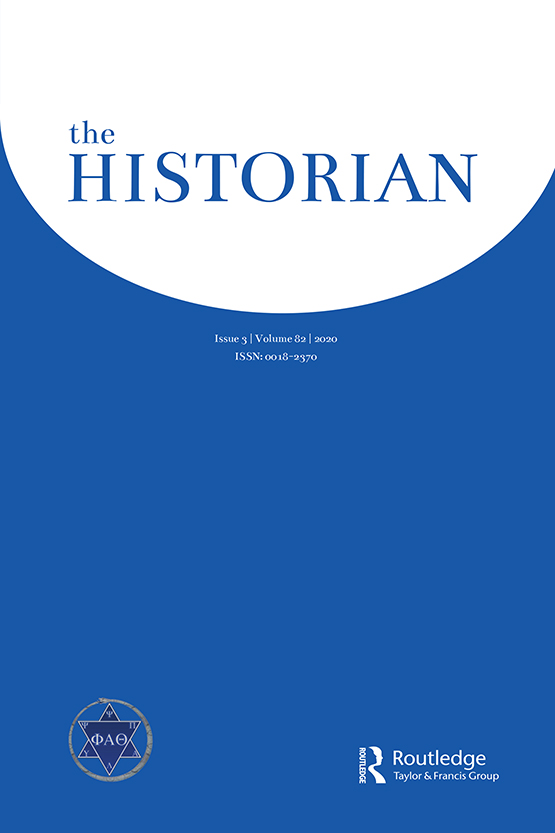

“The Story Was Not Printed”: The Press Covers the 1930s Banking Crisis
Journalism History 45 (March 2019): 25–44 [link]
The numerous bank failures that were a defining feature of the Great Depression received minimal news coverage. During the early 1930s, the news media consistently downplayed the problems that pervaded the nation’s banks and rebuked small depositors for their lack of confidence. While studies reveal that bank management bore significant responsibility for the era’s bank failures, contemporary newspaper reports routinely blamed suspensions on depositors seeking to salvage their savings, and even alleged that communist subversion lay behind the banking crisis. The news media’s focus on small depositors and communists directed public attention away from problems with the banks themselves. The era’s press projected the ideological outlook of powerful financial and business interests that thought depressions were inevitable and substantial economic reforms inadvisable. Bank failures continued until 1933, when the entire system finally collapsed and the Federal Deposit Insurance Corporation was established. If the press had addressed the financial situation more forthrightly, banking reforms might have been implemented earlier.
“Tired of Being Exploited”: The Grassroots Origin of the Federal Farm Loan Act of 1916
Agricultural History 92 (Fall 2018): 512–40 [link]
The Federal Farm Loan Act of 1916 repudiated the creed of laissez-faire by declaring that government had a responsibility to assist ordinary citizens economically. Farmers had made affordable credit a political issue well before the Panic of 1907 thrust banking reform to the center of national policy discussions. Following this crisis, farmers called for the national government to make agricultural loans. Farmers’ advocacy—which was often channeled through their voluntary membership organizations—both compelled legislative action on agricultural credit and ensured a governmental role in the Federal Farm Loan System. Progressive Era farmers had succeeded in institutionalizing an idea that bankers opposed and the political elite otherwise never would have considered. The full consequences of this innovation in governance were unanticipated. The Federal Farm Loan System provided a precedent for subsequent New Deal programs that aided ordinary Americans.
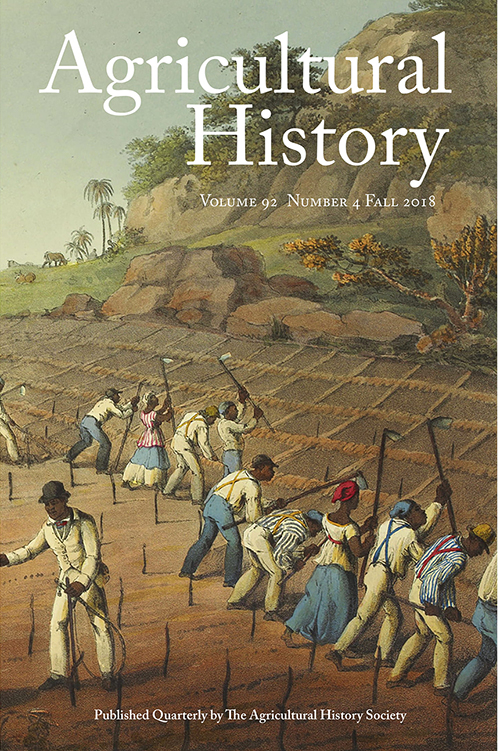
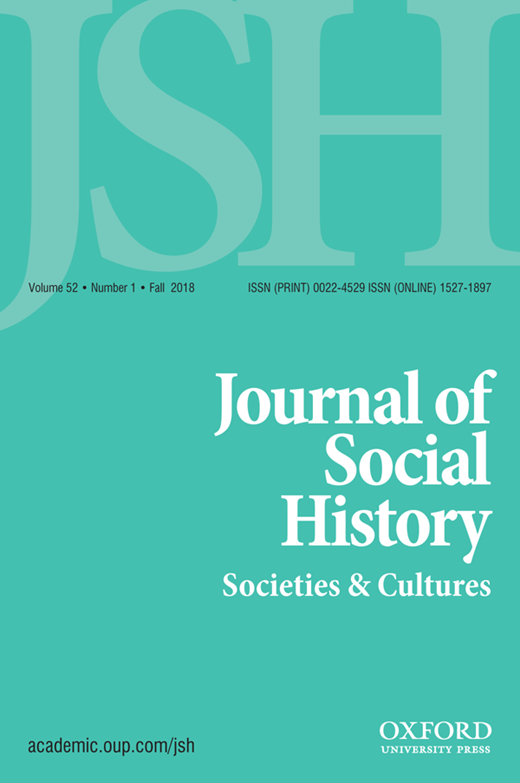
“Banks of the People”: The Life and Death of the U.S. Postal Savings System
Journal of Social History 52 (Fall 2018): 121–52 [link]
From 1911 to 1966, the United States government operated a savings bank at local post offices. Throughout the early twentieth century grassroots agitation to expand the Postal Savings System served as an oppositional political force to the power of bankers. Working people advocated a postal bank that would prioritize financial security, affordable credit, and macroeconomic stability. The banking fraternity aggressively opposed efforts that workers and farmers made to expand postal savings. The failure of more than one-fifth of the nation’s banks during the early Great Depression placed the private banking system’s future survival in doubt. The extension of postal savings was a distinct possibility. However, New Deal programs responded to the banking crisis by guaranteeing bank deposits and providing affordable credit to homeowners and farmers. These reforms reduced popular interest in extending postal savings. By 1966 the political opposition facing banking interests was much diminished. Bankers finally succeeded in terminating the Postal Savings System.
“We Must Deflate”: The Crime of 1920 Revisited
Enterprise & Society 17 (September 2016): 618–50 [link]
Post-World War I Federal Reserve System policy focused on reducing price levels. Faith in liquidationist ideas led Federal Reserve officials to maintain tight-money policies during the depression of 1920–1921. Farmers suffering through this economic crisis objected to contemporary monetary policy. Organized labor and leading Progressive reformer Robert M. La Follette, Sr., seconded their criticism. Postwar challenges to the nation’s financial leadership and its priorities bore tangible results by producing a number of notable reforms, including modifications of Federal Reserve policy and the Agricultural Credits Act of 1923. In the absence of similar political pressure during the Great Depression, the Federal Reserve System adhered to liquidationist ideas and did not pursue monetary expansion.

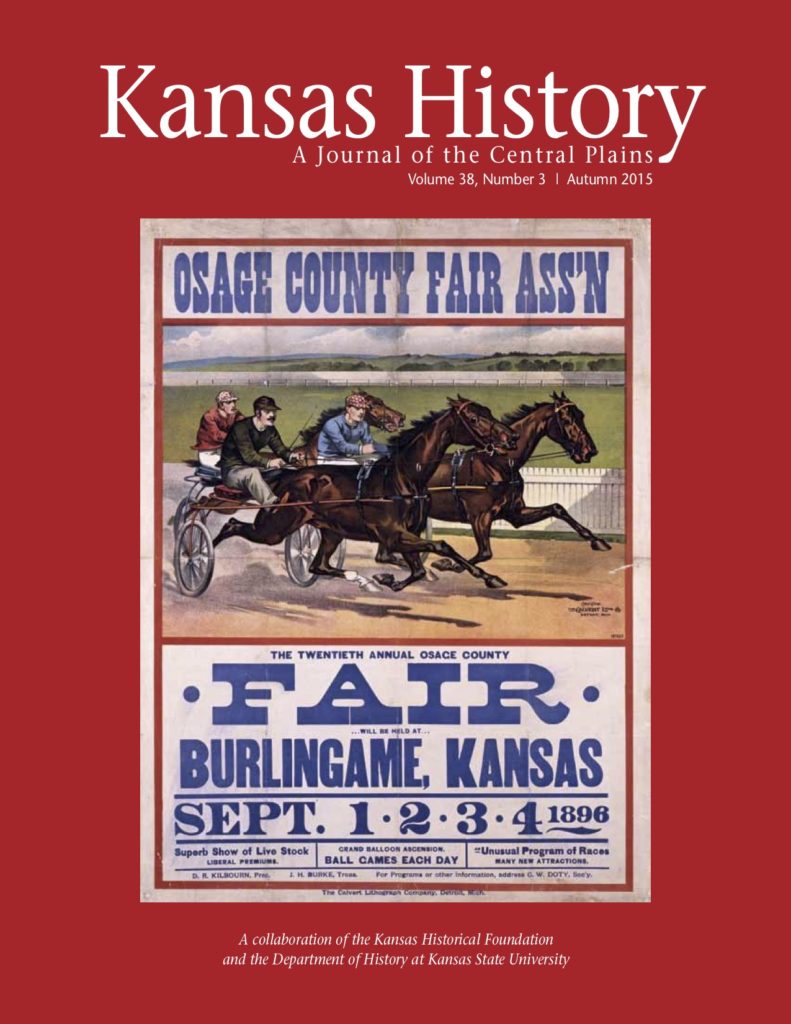
“Of Great Benefit”: The Origin of Postal Services for Blind Americans
Kansas History 38 (Autumn 2015): 180–91 [link]
In 1899 blind Americans gained the right to mail letters at reduced postage rates. Mailing letters had been comparatively more expensive for blind people, because systems of embossed writing—such as Braille and New York Point—required sheets of paper that were thicker and heavier than standard writing paper. Kansas Populist Mason S. Peters, Sr., shepherded this postal reform through Congress. The 1899 “act regulating the postage on letters written by the blind” expressed Populists’ concern for society’s more vulnerable members and their advocacy of government programs that promoted social welfare.
“The Man in the Street Is for It”: The Road to the FDIC
Journal of Policy History 27 (January 2015): 36–60 [link]
Banking panics and bank failures were a regular feature of American life until the national government guaranteed bank deposits in 1934. The Federal Deposit Insurance Corporation was the product of a longstanding campaign that ordinary citizens waged to have government secure their savings. Despite the active hostility of most bankers and the opposition of influential political figures, workers and farmers compelled the inclusion of the FDIC in the Banking Act of 1933. But opponents of guaranteed deposits managed to extract something in return: loosening of restrictions on branch banking. Thus, the FDIC’s creation reduced risk for individual depositors while contributing to the growth of banking concentration and ensuing systemic risk.

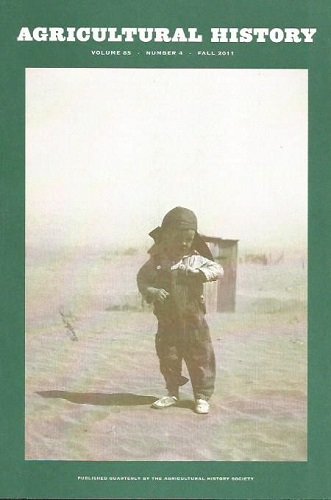
“No Place For Class Politics”: The Country Life Commission and Immigration
Agricultural History 85 (Fall 2011): 520–39 [link]
In 1908 President Theodore Roosevelt formed the Country Life Commission to address contemporary concerns over the state of rural America. One of the issues that commissioners planned to address provoked an internal impasse: the relationship of immigration to agriculture. Charles S. Barrett, president of the Farmers Educational and Co-operative Union, insisted upon removing a section of the commission’s report that raised the possibility of settling immigrants in rural areas. His organization was actively pursuing political partnership with the American Federation of Labor. Barrett forced fellow commissioners to confront the existence of a rift between small farmers and organized labor on the one hand, and large agricultural and business interests on the other. The commission’s encounter with immigration is emblematic of its general hesitancy to address issues arising from economic divisions.